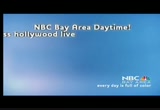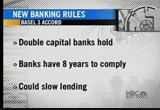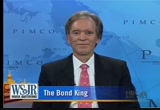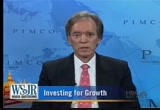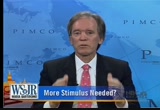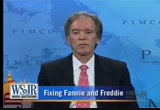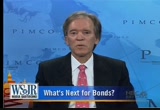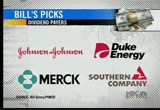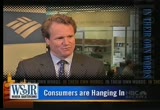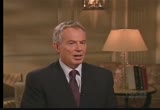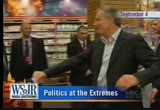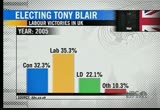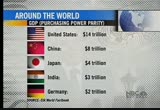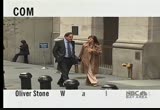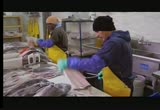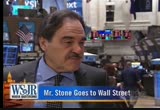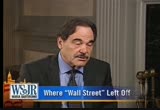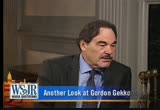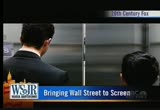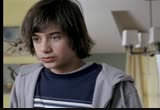tv Wall Street Journal Rpt. NBC September 19, 2010 4:30am-5:00am PST
5:30 am
hi, everybody, welcome to "the wall street journal report." i'm maria bartiromo. when he speaks, the markets listen. bill gross, the man who manage more than a trillion dollars. and the world's largest mutual fund. the economy and the new normal. then my interview with former british prime minister tony blair. the private difficulty of his decision to invade iraq and political struggles. plus, controversial director with a distinct point of view. now oliver stone has his sights set on wall street once again. "the wall street journal report" right now. >> this is america's number one financial news program, "the wall street journal report."
5:31 am
now maria bartiromo. >> here is a look at what is making news as we head into a new week on wall street. on the second anniversary of the bankruptcy of lehman brothers and the near collapse of the american financial system, an important new agreement to help shore up the banking system worldwide. international regulators in basel, switzerland reached a compromise on new rules that will governor banks. it will force them to double the minimum amount of capital that they will hold as a cushion against unexpected losses. but it gives them eight years to comply with the results. new regulations can limit the amounts banks can lend and could drive up costs for customers. that agreement helped push the markets up on monday, but they broke a four-day winning streak on tuesday. they rose again on friday. retail sales are on the rise. august seeing the biggest spike in five months, with a gain of 0.4 of 1%. that's helping to ease fears of a double dip recession because the american consumer makes up nearly 70% of the u.s. economy. and technology giant cisco will
5:32 am
start returning some of the nearly $40 billion in cash it has to shareholders. the company says it will pay a dividend in 2011 of about 1% or 2%. bill gross is the founder and cochief investment officer of financial giant pimco with more than $1.1 trillion of bonds and stock under its management. his total return fund is the world's largest mutual fund, valued at $247 billion. and his words carry weight on wall street and around the world. he joins me right now to talk more. bill so, good to have you on the program. thanks for joining us. >> thank you, maria. >> so it's been two years since the collapse of lehman brothers. you and your pimco team say we've entered a new normal. diminished expectations and growth. tell us what that new normal may look like. >> well, it looks like a slow growth environment with high unemployment in the united states. and it looks like a global economy in which developing economies such as china and brazil do much better than developed countries such as the
5:33 am
united states and england and those countries in euroland. so there is a distinction to be drawn going forward not only in terms of the slower growth for developed countries, but for the orientation towards higher growth in developing markets. >> so how do you invest based on that? >> well, i think you invest for growth. that's always been the key to investing, not only from the equity standpoint, but from the long standpoint. so you look towards those countries with relatively high real interest rates on the bond side that would be countries like brazil and canada and australia, and you look for countries not to own that have relatively low interest rates, and that would be japan and yes, perhaps the united states. >> so we shouldn't then have expectations that we're going to see real growth in the united states or are there policies or things to be done to get growth moving again? do we need more government stimulus, for example? >> well, i think we need
5:34 am
continued government stimulus, but in a different form. i mean, up until this point, policies have been ad hoc. the recent policies in terms of cash for clunkers and extended benefits for unemployment, tax cuts is now on the table for small businesses. these are all ad hoc. what needs to be done in our opinion is a coordinated policy, much like is happening in china, and much as what has occurred in the 1930s with fdr. it needs to be directed towards a yes infrastructure, directed towards green energy, but certainly less ad hoc and more structurally-oriented as economists call it. >> bill, you recently testified in washington about your ideas to fix fannie mae and freddie mac. you called for forming a giant government agency with tighter regulations. is your idea getting any traction? can you explain how it may work? >> well, it's not getting much traction, but the fact is that 95% of the mortgages these days that are generated and that are issued are basically being
5:35 am
guaranteed by fannie mae and freddie mac. that's the reality. and the reason it's the reality is that in terms of the private mortgage market, that lenders are requiring down payments of 20, 30, and in some cases 40%. and so the cost of that financing is prohibitive. my point is simply it's better to have the private market in the housing market in terms of finance, but it's not likely to be a significant influence. and it will be much more costly. and so for the next few years, for the next two, three, four, five years, let's examine possibilities in the out years, but let's maintain government influence, because the financing is much, much cheaper. the difference is 4% in terms of agency financing, perhaps 7% in terms of private mortgage finance. >> so you recently cut your holdings of government treasuries in your very successful total return fund from 54% down to 36%. why did you do that? what are your expectations for bonds and interest rates?
5:36 am
>> well, interest rates are low. not likely to go much higher simply because of the slow-growth economy and the fact that inflation is low. core inflation as announced this past week was zero percent, and it's been zero percent for three of the last five months. that to me suggests that a ten-year treasury at 2 3/4 is a relatively decent value. when we cut treasuries down in percentage terms over the past month or two, basically it was to buy, yes, those fannie mae and freddie mac mortgages at 4 and 4 1/2%, and to buy corporate bonds in the same yield category. so simply a move to increase yield with a modicum of safety involved. >> so bill, what would be your advice to investors right now? for that person out there that is looking at this new normal, as you explained it, what does it mean for them, for the average person out there that the east is rising and it seems that the west is declining? >> well, it means that the returns are going to be lower.
5:37 am
if they're looking for 10% pace of returns to pay for college, or to pay for retirement, basically that's not in the cards. so an investor should expect 4 to 5%. it doesn't have to be in bonds. kit be in stocks there are decent alternatives in a slow-growth environment in the stock market that incorporate global types of companies. for instance, johnson & johnson yields 3 1/2%. that's an attractive high quality stock. merck yields 4%. that's an attractive stock. you know, selected utilities such as southern company and duke energy, those are all equities that can yield 4 to 5% in a relatively safe type of environment going forward. >> bill, thank you so much for your insights. we so appreciate your time today. >> you're welcome. >> we will see you soon. bill gross from pimco. well, new banking rules across the world, the strength of the american consumer, and remembering the fall of lehman from the front lines. those are the hot topics ceos and washington insiders were talking to me about this week. here they are in their own
5:38 am
words. >> a momentary sense of fear. usually when you're dealing with stuff that is coming at you, i didn't have time to be afraid. that was when i realized there was no solution. >> the consumer is hanging there. they're spending. the unemployment numbers are stable. that's not a good thing because we got to bring them down. and a lot of discussion in america ought to be how to get people back to work. but you think of the broader context, the numbers are increasing which consumers are doing fine. >> about the rules, what we need was certainty, and we're finally getting some certainty. the new capital requirements of liquidity requirements have not been anticipated. and we're comfortable with that. what we and the markets, shareholders are looking for is will make stronger banks as we move forward. up next on the "wall street journal report," tony blair reflects on private struggle and
5:39 am
politics. >> people often forget i won an election after. >> i sit down with an interview with the former prime minister. and he is back. gordon gekko and his famous creator, oliver stone, return to the streets and the screen. as we take a break, take a look at how the stock market ended the week. [ male announcer ] the turn changes everything. ♪ the turn will make you think. ♪ make you re-examine your approach.
5:40 am
5:41 am
tony blair led the uk for more than a decade and is now leading the international effort to understand the middle east's economy and society. blair's memoir a journey about his political career is in bookstores now. i spoke with him about his most difficult decisions in office. >> i think the most difficult war and peace decisions, if you like, so iraq obviously, afghanistan to an extent, sierra
5:42 am
leone, probably the northern ireland peace protests also had really, really difficult points of decision making, because those are the ones where the sense of responsibilities is so acute and where you actually know people's lives literally will be affected by your decision. >> do you have a difference in terms of how you feel today having been able to take a step back? >> i think yes in a way. in the sense that particularly now i've spent a lot of time out in the middle east as the quartet representative for the middle east peace process. so my take on what is happening with this extremism within the world i think is slightly different, probably a little deeper than it was back then, which is not to say i think i would have made different decisions. but i think particularly when september 11th happened, you know, there was a tendency at that time to think this is a small group of extremists. we deal with them, we get rid of the regime that harbored them, life will be better. where as actually now i see this is a far deeper, with the roots
5:43 am
right, right down into parts of society. and i think it's probably a far longer and bigger struggle. >> are you surprised at sort of the extremism in politics today? there is sort of an us versus them type attitude when you have the promotion, the book promotion in ireland. you had some disruption of your time there. you canceled a similar event in london. were you surprised by that? what does this tell us about politics today? >> the people that mount these protests, that throw things and shout things and everything, in my experience, they're not representative of the broad majority, who even if they disagree with express that disagreement reasonably. the second thing, though, is something i call the tyranny of the protest. which means today in the world in which we live in politics, if you particularly with 24-hour a day, seven-day a week media, if you come out and do something extreme. suppose even a public meeting that a politician is holding, they've got a thousand people in the audience and five of them
5:44 am
stand up and shout and throw things, i can guarantee the five will take the publicity. >> wars create upset, uncertainty and are very tough. >> that is absolutely natural that people feel very strongly. but even with those things, my experience, even with the decision like iraq, which is very, very controversial and difficult, people often forget i won an election after iraq. and that was because in the end, although the strong disagreement, nonetheless people also understood it was a difficult decision. >> how important was your relationship with washington during that time, and over time in general? >> crucial. i mean it's always right that the british prime minister gets on with the american president and forms a strong relationship. and in the world that is being created today, where, you know, you've got power shifting east, china, the population of 20 times that of the uk. india roughly the same. and then you've got country likes brazil and indonesia and so on, right.
5:45 am
in the world that is developing, a country like mine, and even in a way a country like yours, you need these alliances in order to be able to exercise power and influence and get weight for your views. when i say to people of the uk, the population of china will grow next year by roughly the entire population of the uk, wow. when you say to them india will produce more civil engineers next year than the whole of europe put together. when you say we got a debate in uk whether to build another runway at heathrow. china is going to build 7-0 new international airports in the next 10, 15 years. what we've got to understand is the scale of this. you know, what will go on in china is an industrialization that is about four times the size of that of the u.s. and about five times the speed. now that's what is going to go on. and for all of us, we were
5:46 am
brought up with european or western governance, really. for the last not just 100 years, the last several centuries. history was written through our eyes. history is no longer going to be written through our eyes. it's going to be a shared future in which every bit as much tension will focus on the east as the west. >> prime minister blair has pledged all the proceeds of his memoir sales to a charity for wounded soldiers. up next on "the wall street journal report," a walk on wall street with oliver stone. the director returns to the neighborhood with his sequel to the iconic 1980s film. what will the industry make of its star return now? >> a
5:48 am
words alone aren't enough. our job is to listen and find ways to help workers who lost their jobs to the spill. i'm iris cross. we'll keep restoring the jobs, tourist beaches, and businesses impacted by the spill. we've paid over $400 million in claims and set up a $20 billion independently-run claims fund. i was born in new orleans. my family still lives here. i'm gonna be here until we make this right.
5:49 am
well, two decades after greed is good, gordon gekko and oliver stone are back on wall street. the oscar-winning director of films like "born on the fourth of july" and "platoon" returns to the drama of american finance in the sequel "money never sleeps," inspired by the banking crisis of 2008. this week i spoke to stone about the film, which i was honored to appear in, and why wall street is more than an address, it's in his genes. >> michigan my father was a stockbroker since the 1930s. so i grew up on wall street in new york in the '50s and '60s. when the '80s happened it was shock. >> does it feel the way it did to you when you were shooting
5:50 am
near the 1980s? >> a little bit. yeah, it's the same look, but it's changed. the electronics are so much better now and it's quiet. it was grittier, more like the floor of a restaurant. >> isn't that amazing that no one had written about it and shown it the way you actually immortalized it? >> actually, i was coming off "platoon" which was a huge world success. it gave me a chance. i wanted to make a movie about finance. no one was interested. nobody gets killed. humanize it, give it a face. >> you are not inside, you are outside, okay? >> the film's face was gordon gekko, the ultimate 1980s corporate raider inspired an entire generation's idea of wall street and the people who work there. michael douglas won an academy award for the role. >> the point is, ladies and gentlemen, that greed, for lack of a better word, is good. >> do you think greed is good? >> i always thought it was a
5:51 am
facetious comment. it was a speech and a throw-away line. in december, '87. everybody was talking about the crash and the new wall street and what was going on. and it seemed like the end of an era, the crash to me. but i was wrong, completely wrong. the film did well. it was a modest success, but it lasted. it went on and on. the lines were iconic. the dialogue lasted. gekko was quoted and so on. it wasn't meant as a corrective. it was just meant as a story. >> why go back to the story now? >> they asked me to do the sequel back in 2006. we wrote a script, but i felt -- i had second thoughts. i don't really want to celebrate this culture of super greed, you know. greed is now legal the idea is, got ridiculous. and $100 million became really a billion dollars. 2008 had sort of a punishment that was hopefully a moral reckoning. really in many ways wasn't, but you felt there was some justice in the world. >> gordon gekko was one of the biggest names on wall street before he went to prison for insider trading.
5:52 am
>> mr. gecko! >> my name is jacob moore. i'm going to marry your daughter. >> the movie is not in my mind about the crisis. that's the background only. we echo it. we march alongside it. but we're telling the story of five people inside this tank, this shark tank. >> so what were you trying to say? i mean what do you want to take away to be? >> the take-away is family. we're all torn, you know. we're all angels and devils. we're torn between our values of family and loyalty and trust, and that of betrayal and greed. >> stone's opinion of greed and his left of center politics since the 1980s have made him some enemies on the street he immortalized. >> the big banks would not let us in. >> why? >> because they're arrogant. they're scared. they're making so much dough, they're not going to let anybody. goldman said no photographs. >> they were afraid the way you were going to portray them. >> egot photographs from an insider and talked to insiders who had been there. >> your show is a big, big hit
5:53 am
in the can. >> you watched it in prison? >> did anyone say i don't want to be involved? in addition to those big banks who didn't want -- >> oh, sure. >> to portray. >> i haddin were steve schwartzmann. he didn't want to do it. they're conservative. i can see why they'd be scared. they think of a radical bomb-thrower and anarchist, all these inflated pictures. >> they're afraid of you. >> someone reminded me i once said greed is good. now it seems it's legal. >> oliver, you were shooting all over new york, not to mention other places as well. how tough is that? talk to us about how you shoot here. >> it was a nightmare. we were the fall of last year. we had 40 some locations. we were moving sometimes twice a day. >> ready, and action! >> we covered everything, the subway, fordham university, uptown, the bronx. it's a rich world. it's not about the working class as it is about the glamour and
5:54 am
the grit of new york and the desire to make a billion dollars. >> are you always working on something? you mentioned, you know, right after "platoon," wall street. >> i did ten films in ten years. that was really a challenge. they're big films. i slowed down a little bit with age. but the movie business rolls over. it's like the stock market. you have to keep moving. memories are short. >> my thanks to oliver stone. stone's next film is a documentary about latin america. for more on that and other special video clips, check out our website, wsjr.cnbc.com. up next on "wall street journal report," we'll take a look at the news this upcoming week that will have an impact on your money. and then the sweater in formally known as fructose. will calling a spade a spade clear up consumer confusion? what do you say we get the look we want, the softness we need, and an unbeatable lifetime stain warranty for whatever life throws at it. then let's save big on the installation. ♪ we're lowering the cost of going barefoot.
5:55 am
5:57 am
now a look at the stories coming up in the week ahead that may move the markets and impact your money this week. tuesday the feds' open market committee ends a two-day meeting and releases its latest statement on interest rates. also, the total number of residential units that began construction in august will be reported on tuesday. thursday president obama addresses the united nations general assembly. heads of state are convening to mark the u.n.'s 65th session. and total existing home sales for last month are reported on thursday as well. and on friday, new home sales will be reported. finally, what is in a name?
5:58 am
the makers of high fructose corn syrup added it to everything from ketchup to crackers have petitioned the fda for a name change. the corn refiners association argues the name corn sugar more accurately defines the ingredient, and they hope that will sweeten its image as well that will do it for us today. thank you so much for joining us. next week a special program from the annual meeting of the clinton global initiative, where i will be speaking with former president bill clinton. keep it right here where wall street meets main street. have a great week, everybody. we'll see you again next weekend. !%
5:59 am
[ female announcer ] we know jerry brown was mayor of oakland, but what were the results? fact: brown promised to improve schools. but the drop out rate increased 50%, and the state had to take over the schools. fact: the city controller found employees paid for 22,000 hours... they never worked. fact: brown promised to cut crime. but murders doubled, making oakland the 4th most dangerous city in america. jerry brown. he just can't deliver the results
105 Views
IN COLLECTIONS
KNTV (NBC) Television Archive
Television Archive  Television Archive News Search Service
Television Archive News Search Service 
Uploaded by TV Archive on

 Live Music Archive
Live Music Archive Librivox Free Audio
Librivox Free Audio Metropolitan Museum
Metropolitan Museum Cleveland Museum of Art
Cleveland Museum of Art Internet Arcade
Internet Arcade Console Living Room
Console Living Room Books to Borrow
Books to Borrow Open Library
Open Library TV News
TV News Understanding 9/11
Understanding 9/11